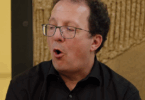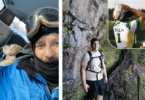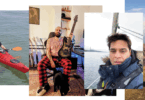Music is Powerful…
by Glenn Wilson, Southern Company, USA
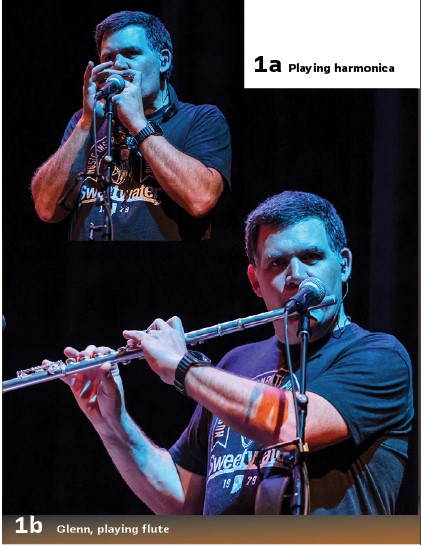
Listening to a song can instantly transport a person to a particular place in time. And it’s that connection of music and memories that pulls at me constantly…
My name is Glenn Wilson, and I’m a research engineer in the United States. When I’m not at work or spending time with family, I enjoy developing my skills in music and aviation. I acquired an early love for these in my childhood, and I never really dreamt I’d get a chance to combine these passions later in life.
My family appreciated music and encouraged me along the way. My grandfather and great uncle played harmonica and would always encourage me to play one when I would visit. I was mediocre, at best, but they always challenged me to learn a song and perform it for the family.
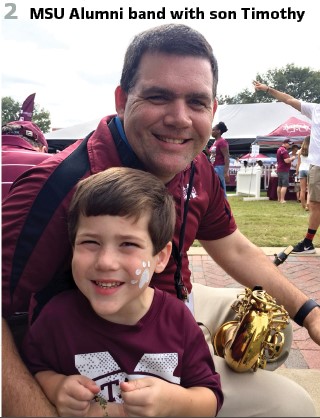
When I was 8 or so, my family got an old upright piano. I took lessons, but the structure of lessons was not for me. I would spend time picking out songs by ear and examining chords. I wasn’t so much interested in the music theory as I was examining how different chords evoked different types of emotions. I was intrigued at how a single note could completely change the feel of a song. The preference to play by ear was one that considerably annoyed my piano teachers, because I preferred playing by ear than practicing proper technique.
When I was 10, I was gifted an old alto saxophone. It was in horrible shape, with several broken springs that I fixed using rubber bands. But it worked until I joined the school band in 6th grade. The band directors realized the quality of the horn and convinced my parents to buy me a semi-professional horn. It played so well that it sparked a competitive side of me. As an 8th grader, I took lessons from a collegiate professor who instilled a discipline that I would learn to apply toward other instruments. By the time I was in high school, I managed to work my way to the top of the most competitive high school band in the state, the Mississippi Lions’ All-State band.

This band of about 130 kids from the state of Mississippi would convene in the summer for a couple of weeks. After an aggressive session of learning material and parade routines, the band would travel across the world to wherever the National Lions’ Convention was held that year. That introduced me to international travel. In my tenure in the band, we performed in Seoul, South Korea, Phoenix, Arizona, and Montreal, Canada. (see Figure 3).
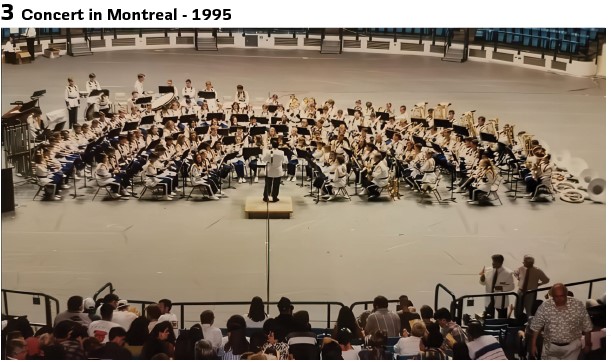
While I was in high school, my father and I took a community guitar class where I learned the acoustic guitar. The acoustic guitar allowed me an escape. It could be a solo instrument, and it could be used to cover just about any song or tell any story.
My high school had amazing music staff. We had outstanding band directors and a really gifted choral director. Our choral director encouraged individual as well as traditional group performances. Her biggest contribution to our school was the opportunity to sing in Carnegie Hall in 1995. My band directors embraced my piano skills and encouraged me to experiment with jazz chords and alternative arrangements. And this led to my first gig.
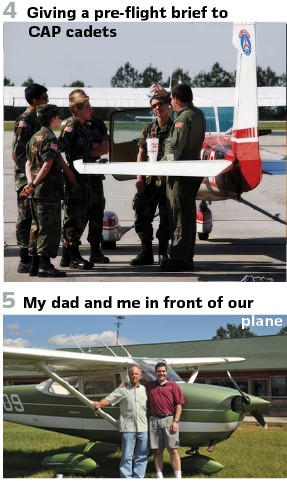
One of the directors played the bass guitar. He and a fellow electric guitar player invited me to join in as a keyboard player as entertainment for a community banquet. They taught me how to use my ear to add fills that complemented their parts. It was a once-and-done gig, but the seed for public performances was planted.
I attended college at Mississippi State University and was in the marching and symphonic bands. Although the crowds weren’t there to see us, we still marched in front of crowds of over 100,000 in stadiums across the US (Figure 2). I was saddened when this stage of life wrapped up. I thought my music career was over.
It turned out that the guitar player whom I played with in my one and only gig was a 737 pilot for Jet Blue. He paid me for that gig by giving me an intro flight in a private plane. It eventually led to me getting my pilot’s license out of college. Flying was somewhat expensive (even for an engineer), so I joined the Civil Air Patrol (CAP) and started doing search and rescue flying for them (Figure 4). It was a way for me to build up flight time while providing a much-needed service to my fellow pilots, and along the way, I managed to convince my dad to get his license (Figure5).
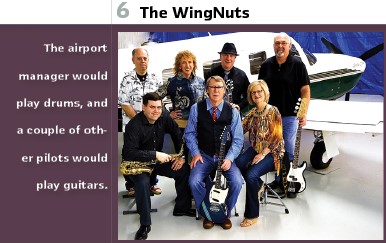
About 8 years into this, the CAP was having a cookout at my local airport. A few pilot friends of mine tossed around the idea of pulling together a band to play four or five songs for entertainment. The airport manager would play drums, and a couple of other pilots would play guitars. I’d play keys and sax, and a friend of ours joined to play bass. Together, we were The Wingnuts (Figure 6).
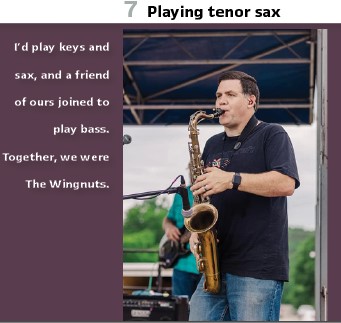
That first event was way bigger than we realized. Within a few months, we played for a state aviation convention, and our demand grew. We played across the Southeast US, from Atlanta, GA, to Gulf Shores, AL. Most of the events for the first six to seven years were corporate gigs or private parties. We focused on playing vintage rock and roll – The Beatles, early Eagles, Elvis, Roy Orbison and the Rolling Stones. Anything that was in that era, we would play. (see Figure 10).
As we added songs, I added instruments. Eventually, I was playing tenor and alto sax, harmonica, acoustic guitar and keys. I was the fill guy for anything that wasn’t an electric guitar or drums (Figure 7).
In 2015, we were asked to put on a concert as a fundraiser for a local charity event. Our group wasn’t exactly the image of rock and roll. Our music was a very close cover version of the originals, but we needed something other than our appearance and fancy lights to keep the audience engaged. We did this through story telling. That technique has carried on to this day (Figure 8).
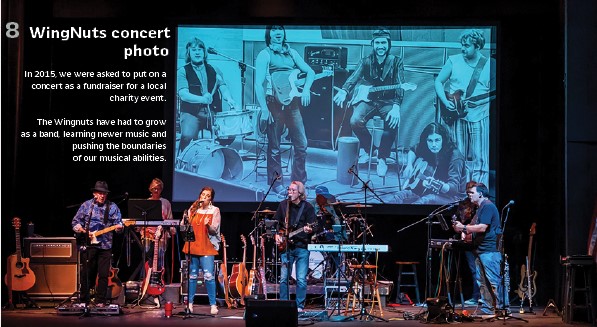
Our concerts largely consist of us playing music around a given theme, and we have a multi-media presentation that plays behind us that helps tell the story of the music. Each song has a dedicated video that focuses on the song, the artist and other historically relevant items. Remember how I said music has power? We transport the audience back in time with each one of our shows.
I enjoy watching the audience respond and react. They’re not reacting to us – they’re reacting to the music. It’s magical (see Figure 1a).
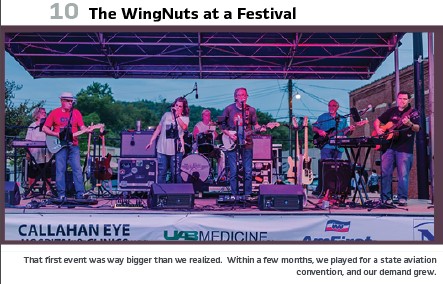
The WingNuts have had to grow as a band, learning newer music and pushing the boundaries of our musical abilities. We had a concert that was focused on the music of the Vietnam War era, with a music selection that our local veterans said was important to them during that period. That concert series, “Run Through the Jungle” had numerous sell-outs in our local area. (see Figure 1b).
Our most recent concert series added the music of the Marshall Tucker Band, Supertramp, the Moody Blues, Eric Clapton and Jimmy Buffet to name a few. And in my role as the filler, I’ve added the flute and soprano sax to my list of instruments.
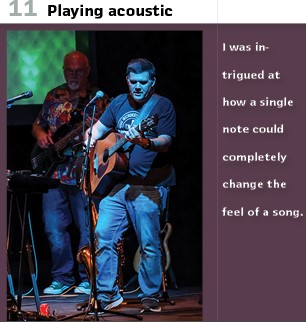
When we play in public, we want the audience to feel as if they’re listening to the original band. That presents a fun, competitive challenge for me that is incredibly motivating. And the adrenaline of being on stage is addictive, if I’m being honest. The WingNuts have been going strong for over 13 years. Our upcoming concert series will be focused on the creation of the Southern Rock genre (Figure 11).
I also enjoy bluegrass, and I play upright bass with a bluegrass gospel group with a few guys from my church. One of the things that is great about bluegrass is that it helps people – especially kids – see how organic music can be. It’s not canned music on the radio, but rather an organic composition that is created right before them. I’m hoping that inspires my kids to explore the creative, collaborative aspect of music. I’m hoping they start experimenting with how music can connect with the soul – just like I did when I was their age.
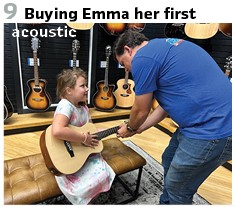
While I’d love to play (just once) for a crowd of 10,000 or more, it’s not likely to happen. I’ve got two young kids who are starting to show a real appreciation for music. My biggest accomplishment might just be to pass along the love of music to them, along with the realization that there’s nothing you can’t do if you put your mind to it. (see Figure 9).
Traveling to some of the international PAC World conferences has introduced me to new music, as well. Witnessing the joy of the locals in Athens as their music was played at the Gala dinner was one of the coolest things I’ve seen lately. I was able to see the magic of music work in a new and exciting way.
And at the same time, I’ve been able to encourage some of my friends to hopefully pick up an instrument and learn it. If you’re contemplating learning one, find a song that takes you back and evokes some powerful emotions. Learn to play it and watch the people around you transform. I think you’ll agree that music is powerful.
Biography:
Glenn Wilson is a research engineer for Southern Company and is based in Birmingham, AL. He has degrees in electrical and computer engineering from Mississippi State University. He has worked in the electric utility industry for over 25 years, with experience in transmission operations, protection and control, transmission maintenance, and geographic information systems. Glenn is currently responsible for research involving substations and transmission lines. He is married to Laura and has two kids, Timothy and Emma.



